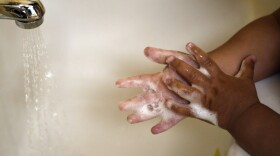Patti Neighmond
Award-winning journalist Patti Neighmond is NPR's health policy correspondent. Her reports air regularly on NPR newsmagazines All Things Considered, Morning Edition, and Weekend Edition.
Based in Los Angeles, Neighmond has covered health care policy since April 1987. She joined NPR's staff in 1981, covering local New York City news as well as the United Nations. In 1984, she became a producer for NPR's science unit and specialized in science and environmental issues.
Neighmond has earned a broad array of awards for her reporting. In 1993, she received the prestigious George Foster Peabody Award for coverage of health reform. That same year, she received the Robert F. Kennedy Award for a story on a young quadriplegic who convinced Georgia officials that she could live at home less expensively and more happily than in a nursing home. In 1990, Neighmond won the World Hunger Award for a story about healthcare and low-income children. She received two awards in 1989: a George Polk Award for her powerful ten-part series on AIDS patient Archie Harrison, who was taking the anti-viral drug AZT; and a Major Armstrong Award for her series on the Canadian health care system. The Population Institute, based in Washington, DC, has presented its radio documentary award to Neighmond twice: in 1988 for "Family Planning in India" and in 1984 for her coverage of overpopulation in Mexico. Her 1987 report "AIDS and Doctors" won the National Press Club Award for Consumer Journalism, and her two-part series on the aquaculture industry earned the 1986 American Association for the Advancement of Science Award.
Neighmond began her career in journalism in 1978, at the Pacifica Foundation's DC bureau, where she covered Capitol Hill and the White House. She began freelance reporting for NPR from New York City in 1980. Neighmond earned her bachelor's degree in English and drama from the University of Maryland, and now lives in Los Angeles.
-
Early in the pandemic, people were advised to disinfect everything they touched. But now that scientists understand more about how COVID-19 spreads, all that scrubbing down may have been overkill.
-
According to data reported to the CDC, 121 children died from COVID-19 between February and July of this year. And 78% of the children who died were Hispanic, Black or Native American.
-
As schools weigh the risks of reopening, many are making plans to lower the risks of coronavirus transmission. Here's how to vet your school's proposals.
-
For children, the distress shows itself in difficult moods, stomachaches or even regression to behaviors from earlier childhood. Here are seven ideas to help anxious kids feel better.
-
As gyms open for business, new rules aim to limit the spread of COVID-19, including spacing equipment, regular cleanings and limiting attendance. But experts say it's still safer to exercise at home.
-
For many young people, going to college allows them to finally express their sexual orientation or gender identity. Now with schools closed, many are suffering with families that don't accept them.
-
To keep the new coronavirus from spreading in the U.S., hospitals say they need new and sustained funding for good epidemiology as well as more masks, gowns and gloves.
-
The number of workers getting less than seven hours of sleep a night is rising. Stress and our culture of constant connection may be to blame.
-
Pregnant women and people with chronic health conditions such as asthma, diabetes and heart disease are particularly vulnerable to flu complications yet lag the elderly in getting vaccinated.
-
Pain researchers say men and women respond differently to pain, and women may "feel more" pain than men. Understanding the differences in pain perception could lead to better treatments.









